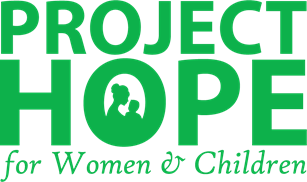Our goal is to provide a stable, supportive environment for women and their children so they can work toward long-term recovery, developing healthy parenting skills and building safe family relationships.
 Project Hope for Women & Children provides a stable and supportive environment for women and their children so they can work toward long-term recovery, developing healthy parenting skills and building safe family relationships.
Project Hope for Women & Children provides a stable and supportive environment for women and their children so they can work toward long-term recovery, developing healthy parenting skills and building safe family relationships.
As a comprehensive treatment facility for women and their children, Project Hope provides onsite peer and residential support, life skills training and mental health services. Our individual approach to treatment also includes educational support services, career development, nutrition, exercise support, parenting and relationship courses, spiritual care and financial education.
Project Hope can house to up to 17 families at a time in individual single-family units. The average length of stay at Project Hope is up to six months.
For more information or to refer a mother to Project Hope for Women & Children, please call 304.696.HOPE (4673).
Project Hope for Women & Children is an intensive residential treatment program for women with substance use disorders and their children. It provides a stable and supportive environment for women and their children so they can work toward long-term recovery, developing healthy parenting skills and building safe family relationships.
For over a decade, Marshall University Joan C. Edwards School of Medicine and Marshall Health have been caring for women suffering from substance use disorder and their children in our clinics and teaching hospitals. Our initiative, in partnership with the Huntington City Mission, is Project Hope for Women & Children, which bridges the gap in the continuum of care and offers hope of a brighter future for mothers and their families on the road to recovery.
As a comprehensive treatment facility for women and their children, Project Hope provides onsite peer and residential support, life skills training and mental health services.
Other services:
Mothers can take comfort in knowing that their children are with them and building healthy attachment bonds while they get the help they need. Project Hope families stay in a single-family apartment complex, which has six two-bedroom and 11 three-bedroom apartments. Average length of stay at Project Hope is up to six months.
After completing the program, clients have the option to continue at Hope House for up to an additional six months. Hope House features four two-bedroom, furnished apartments as well as a group meeting space for ongoing therapy sessions.
Project Hope for Women & Children uses an evidenced-based approach to treatment overseen by the academic medical team at Marshall Health and the Marshall University Joan C. Edwards School of Medicine. Program acceptance is based on formal intake procedure and medical clearance.
Project Hope provides an American Society of Addiction Medicine (ASAM) 3.5 ad 3.1 level of services, which means it is a clinically-managed, high-intensity residential service with trained counselors to stabilize and prepare for outpatient treatment over the course of four to six months. Residential services are described as co-occurring services, which are staffed by designated addiction treatment, mental health, and general medical personnel to provide a range of services in a 24-hour treatment setting.
Treatment includes substance use treatment, medication-assisted treatment (as necessary/wanted), mental health counseling, psychiatric assessment and treatment, life skills, parenting and attachment training, exercise and nutrition support, educational support, job development, financial education and spiritual care.
Clients who choose to live at Hope House after completing the program may start attending classes at a trade school or college or work full- or part-time. Family navigators work to help residents find safe housing options when they move out on their own.
Each of the 17 single-family apartments within the 15,000-square-foot building includes two or three bedrooms, one bathroom, a living room and kitchenette. Much of the construction and initial program costs for Project Hope for Women & Children have been funded through state and federal grants. Therefore, our focus is on ongoing program costs and the “essentials” necessary to make Project Hope feel and function like a home.
Your tax-deductible gift will go to furnish and equip units for each family. This means making an apartment into a home with kitchen appliances, furniture and day-to-day living essentials. You will also be helping fund program expenses. Naming opportunities are available for family units starting at $25,000.
We make it easy with our Amazon Wish List. This includes items for our children as they settle into their new home at Project Hope and for mom as she works toward recovery.
For $500, you may also sponsor a welcome care package for families, which includes items like those listed below. In-kind donations of baby, personal care and housekeeping items are always appreciated. Items accepted include:
|
BABY |
PERSONAL CARE |
OTHER |
|
Baby diapers |
Deodorant |
New full/twin sheet sets |
|
Baby wipes |
Feminine products |
Pots/pans |
|
Bottles |
Shampoo |
Silverware |
|
Detergent |
Soap |
Bus passes |
|
Lotion |
Toothbrushes |
Gas cards |
|
Washcloths |
Toothpaste |
Walmart gift cards |
|
Towels |
|
|
For more information about Project Hope, in-kind gifts or volunteer opportunities, contact:
Kathleen Maynard, MA, LPC, ALPS, AADC
Director, Project Hope for Women & Children
Marshall Health
304.696.HOPE (4673)
For naming opportunities and financial gifts, contact:
Bradley Burck or Kristi Arrowood
MHN Foundations
304.526.2658
MHN Foundations
c/o Project Hope for Women & Children
1340 Hal Greer Blvd.
Huntington, WV 25701
Project Hope for Women & Children
1012 7th Avenue
Huntington, WV 25701
304.696.HOPE (4673)
Your gift creates a safe, supportive environment for mothers and their children.